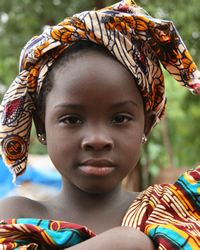Bozo, Jenaama in Nigeria

Photo Source:
Ferdinand Reus - Wikimedia
Creative Commons
|
Send Joshua Project a map of this people group.
|
| People Name: | Bozo, Jenaama |
| Country: | Nigeria |
| 10/40 Window: | Yes |
| Population: | 23,000 |
| World Population: | 481,000 |
| Primary Language: | Bozo, Jenaama |
| Primary Religion: | Islam |
| Christian Adherents: | 0.00 % |
| Evangelicals: | 0.00 % |
| Scripture: | Portions |
| Ministry Resources: | No |
| Jesus Film: | Yes |
| Audio Recordings: | Yes |
| People Cluster: | Soninke |
| Affinity Bloc: | Sub-Saharan Peoples |
| Progress Level: |
|
Introduction / History
From the Bambara term 'Boso' (meaning 'straw-house,' a reference to dwellings located in temporary fishing camps); used for an entire ethnic group. "The Bozo" is really three distinct people groups speaking four varieties of the so called Bozo language. (These varieties are not too close, so spontaneous comprehension is difficult.) Bozo languages include Jenaama, Tigemaxo, Tiemacewe and Kelinga or Hainyaxo. Those who speak Jenaama are the Jenaama Bozo people. This Bozo subgroup lives mainly in Mali and Cote d'Ivoire, but some are in Nigeria where English is a key trade language.
What Are Their Lives Like?
The Jenaama Bozo people highly value community. This is true whether they are village elders or women at a communal water well. Many of them are fishermen and there are fishing camps made up of straw huts on the Niger River islands. The Bozo also work in rice fields.
The women are often maintaining their fires, pounding millet for porridge, scrubbing blackened pots and re-muddling the outsides for cooking again. They can also be seen carding and spinning cotton or other chores. It is also their job to prepare the fish for selling and sell it in the market.
Things however are changing for the Jenaama Bozo as their lives are becoming more modernized. Technology is leveling the tropics - cell phones, video, CD players, television, and satellites are making a huge impact on the society. Money and goods are becoming an important commodity. There is increased accessibility by boat or road; making travel easier and more possible. There is becoming an increase of knowledge and education within the tribe as some are going to school in other villages. Overall, there is very little education within the people group. In general this people group is becoming more aware of the world outside them.
What Are Their Beliefs?
The Jenaama Bozo people are Muslim but they are also Animistic. Before Islam came two or three generations ago they already had their own distinctive Animistic religious systems and worldviews. There are nearby people groups with Christian churches; thus the Jenaama Bozo believe that Christianity is for someone else, not them. Both national and expatriate missionaries are doing evangelism among the Bozo peoples.
What Are Their Needs?
There are various factors to consider when determining how to initially reach out to the Jenaama Bozo. Tribes are vanishing faster than mission organizations are succeeding in translating Scripture into their languages. In general, tribal groups are often refugees, living in perpetual fear of aggression from other tribes or powerful civilizations. Often they are able to survive by finding out how to live where no one else would want the land. This is important to realize that the Bozos are a nomadic people and are thus on the move. It is important to be willing to travel along with them. It will be thus important to slowly enter into the society and gradually become accepted. This people group will likely not respond to being directly evangelized.
Prayer Points
Pray that missions organizations and churches will accept the challenge of adopting and reaching the Jenaama Bozos in Nigeria.
Pray that God will grant wisdom and favor to the mission agencies that are focusing on the Jenaama Bozo people.
Ask the Lord to save key leaders who will boldly declare the gospel.
Ask the Lord to raise up strong local churches among the Jenaama Bozo in his timing.